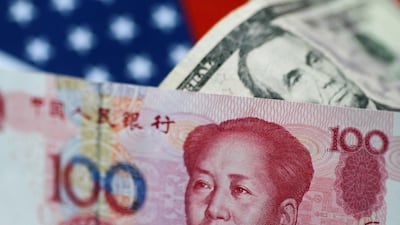While the world has been engrossed with the latest spats over tariff wars, and who and when countries will retaliate against the United States, the Chinese have very quietly set the ball rolling to end the US dollar’s hegemony in international oil trade.
The country introduced in late March the first-ever yuan crude futures contracts on the Shanghai stock exchange. This raised some questions on whether the move was a symbolic one or a sign of long-term assertiveness by the Chinese to introduce the yuan into global trade relations and possibly as an alternative currency of international reserves to the US dollar.
Others saw it as as a sign that China is indeed liberalising and opening up as requested by the US and other trading partners.
What prompted the Chinese to take this action and introduce the yuan-denominated futures oil contracts? The answer is simple: today, the Chinese are the largest commodities contract traders and in 2017 they accounted for 3.052 billion commodity trade lots, valued at a staggering $24.8 trillion.
On the oil front, China has also surpassed the US as top world importer of oil, taking this from 4.85 million barrels per day of imports in 2010 to 9.05 million bpd in 2017. The US, meanwhile, saw its imports of oil drop from 9.24 million bpd in 2010 to 7.33 million bpd in 2017.
Some argue that it will take time for China to manage such a new yuan-denominated oil futures market but they seem to forget that once the Chinese have studied all options and are convinced of the merits of a policy action, they proceed with strength – and they do have a track record to prove this as in the case of nickel. The metal was the last major commodity to be listed in Shanghai in 2015 and to all intents and purposes it was a successful launch because, within six weeks, trading in Shanghai surpassed benchmark futures on the London Metal Exchange.
Among the most intriguing questions is whether the traditional benchmarks of Brent crude in London and West Texas Intermediate in New York will face a serious challenger – with analysts split on the final outcome.
The central question, though, is why have the Chinese decided to launch this new commodity contract? In simple terms it boils down to politics and pragmatism on the type of oil contracts being carried out today.
_______________
Read more:
China's new oil trading platform comes with some risk
Can China really become a rival to Brent and WTI?
_______________
Politically, futures trading would wrest some control over pricing from the main international benchmarks such as WTI, which trades on the New York Mercantile Exchange, and Brent crude, which trades on ICE Futures Europe in London - both of which are based in dollars. Denominating oil contracts in yuan would promote the use of China’s currency in global trade, one of the country’s key long-term goals as an alternative to the dollar – making this even more appealing to sanctions-threatened countries relying on the dollar.
On the pragmatic side, China would benefit from having a benchmark that reflects the different grades of oil that are mostly consumed by Chinese refineries and often differ from those underpinning western oil futures contracts. Seven grades will be deliverable in Shanghai, including some from the Middle East such as Dubai crude, Basrah Light, and China’s Shengli grade.
Another key question is whether foreigners will want to buy into the new Chinese opportunities – some have pointed to the country’s restrictive capital controls, especially after the large yuan devaluation in 2015 caused “hot money’ to flow out of the country. In addition, the Chinese stock exchange has not been as investor friendly as other international bourses although there have been some reforms.
A vote of confidence, of sorts, has been given to the new oil futures exchange through the participation of two of the world’s best known commodity trading companies – Glencore and Trafigura – with others watching to see how the debut exchange operates before joining.
To attract more foreign participation, China will waive income taxes for overseas individuals and institutions. Chinese regulators hope the futures will serve as a risk management tool for its oil companies, as well as help open the country’s financial markets.
Using the yuan in international trade is not new; China has recently been proposing that Arabian Gulf oil producers and others make payments in yuan instead of dollars for its oil imports and has made
this more attractive by making
the yuan convertible to precious metals.
It makes sense in the long run for oil producers looking to enter or gain market share in China to look at transactions in yuan because China is a key market for their exports, thus bringing forward the day of a new “ petro-yuan” like the famous “petro-dollar” of the 1970s. Paying in yuan for oil could also become part of President Xi Jinping’s One Belt, One Road initiative to develop ties across Eurasia, including the Middle East, and entice Chinese investments in the Middle East economies such as the announced intention of Chinese participation in Saudi Aramco’s planned IPO offering.
A Chinese agreement to consider international loans denominated in the yuan was discussed during last year’s China-Saudi Economic Forum in Jeddah as the kingdom seeks to diversify its sources of capital market venues.
While the yuan still accounts for less that 3 per cent of international trade, the launch of the new oil futures index and Chinese willingness to see their currency play a more assertive international role could perceptibly change in the near future and create the conditions for a respectable challenge to the US dollar.
Dr Mohamed Ramady is an energy economist and geopolitical expert on the GCC, a former Professor at King Fahd University of Petroleum and Minerals, Dhahran, Saudi Arabia and co-author of "OPEC in a Post shale world – where to next?" His latest book is titled "Saudi Aramco 2030: Post IPO challenges".

